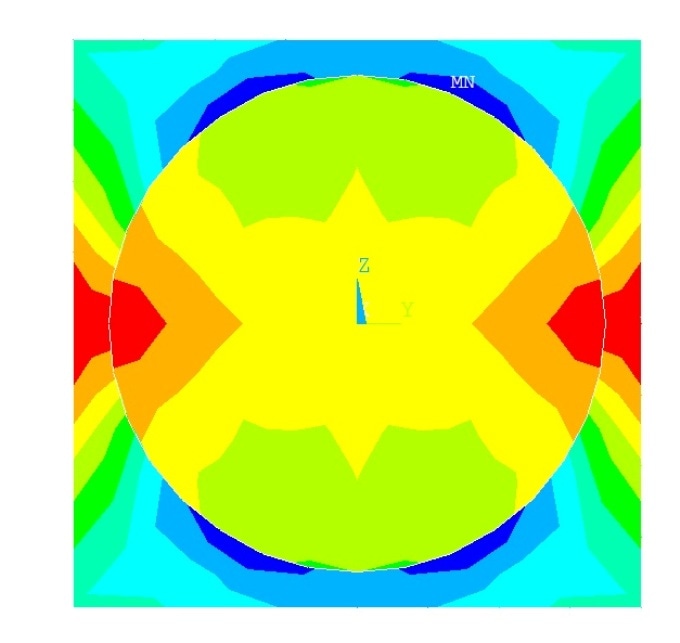AnalySwift, LLC, a provider of efficient high-fidelity modeling software for composites and other advanced materials, announced today it has joined the ANSYS Preferred Partner as a software partner.
 Stress distribution of fiber reinforced composites under uniaxial (e11) and shear (2e12) loading.
Stress distribution of fiber reinforced composites under uniaxial (e11) and shear (2e12) loading.
“AnalySwift is excited to announce this partnership and we look forward to providing a valuable complementary product for ANSYS users, particularly those doing simulation work in composites,” said Allan Wood, president & CEO of AnalySwift. “ANSYS users can easily interface with SwiftComp and VABS to obtain results with 3D FEA-level accuracy in seconds. Due to the uniquely powerful combination of speed and accuracy, engineers can consider more design options and arrive at the best solution faster, as well as handle more complex problems, allowing them to get to market more quickly while reducing costs.”
SwiftComp
“A general-purpose multiscale modeling code for composites, the powerful new SwiftComp interfaces with both ANSYS Workbench and ANSYS Mechanical APDL,” said Dr. Hamsasew Sertse, research engineer with AnalySwift. “With ANSYS Mechanical APDL, SwiftComp can predict both elastic properties and thermoelastic properties for 1D (beams) and 2D (plates/shells), and additionally conductions and piezoelectric analysis for 3D structures. With ANSYS Workbench, SwiftComp can help simulate 1D (beams), 2D (plates/shells), and 3D structures with elastic properties and failure analysis. The SwiftComp-ANSYS GUI can also support several failure analysis capabilities.”
SwiftComp enables users to perform efficient and accurate modeling of composites. It can be used either independently as a tool for virtual testing of composites or as a plugin to power conventional FEA codes with high-fidelity multiscale modeling for composites. SwiftComp provides unified modeling for various types of structures including 1D (beams), 2D (plates/shells), and 3D structures, directly and seamlessly linking micromechanics and structural analysis. It saves hours in computing time and resources with accuracy comparable to modeling all the microstructural details using 3D FEA. SwiftComp quickly calculates the complete set of effective properties needed for use in macroscopic structural analysis. It can also predict accurate local stresses and strains in the microstructure for the purpose of predicting strengths, as well as thermal expansion of composites. SwiftComp also has initial failure analysis capabilities, including predicting pointwise failure strengths distributions, failure envelopes, and effective failure strength for the composite.
“ANSYS users can leverage SwiftComp and VABS in a number of ways,” said Dr. Wenbin Yu, CTO of AnalySwift. “Engineers simulating composite beams, plates, shells, and 3D structures in ANSYS can find SwiftComp helpful in quickly calculating accurate effective properties. It eliminates the need for many of the assumptions required in other approaches. SwiftComp has been used for applications as diverse as high strain composites (HSC) in deployable space structures, printed circuit boards (PCBs), fishing rods, and many more. Due to its general-purpose nature, SwiftComp can handle virtually all types of composites, including stiffened, woven, build-up and sandwich structures.”
VABS
The popular beam modeling software VABS interfaces with ANSYS Mechanical APDL. VABS is a generalpurpose cross-sectional analysis tool for computing beam properties and recovering 3D stresses/strains of slender composite structures. It is a powerful tool for modeling composite helicopter and wind turbine rotor blades, as well as other slender composite structures, such as propellers, landing gear, and high-aspect ratio wings. VABS can calculate ply-level details with the accuracy of 3D FEA in seconds on a typical laptop computer. VABS is capable of rigorously reducing an original 3D slender solid with complex cross-sections into a simple engineering beam model. Because of this, VABS can calculate plylevel details with the accuracy of 3D FEA in seconds on a typical laptop computer. With continuous development funded by the US Army spanning nearly 30 years for performance and robustness, its developers and users have extensively verified the accuracy of VABS.
“Engineers using ANSYS to design and analyze slender composites can leverage VABS to compute equivalent properties for beam elements and recover stress/strain distributions over the cross section,” said Dr. Yu.
Future Developments
ANSYS users can watch for other upcoming developments in connection with this partnership as well. In addition to interfacing its products with ANSYS, AnalySwift is working to release its software on the ANSYS App Store. Additionally, new capabilities are in development for SwiftComp and VABS to handle even more advanced composites simulation requirements.